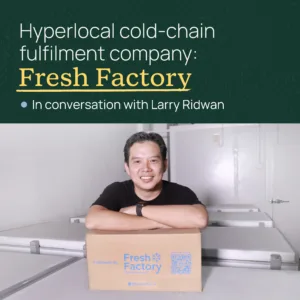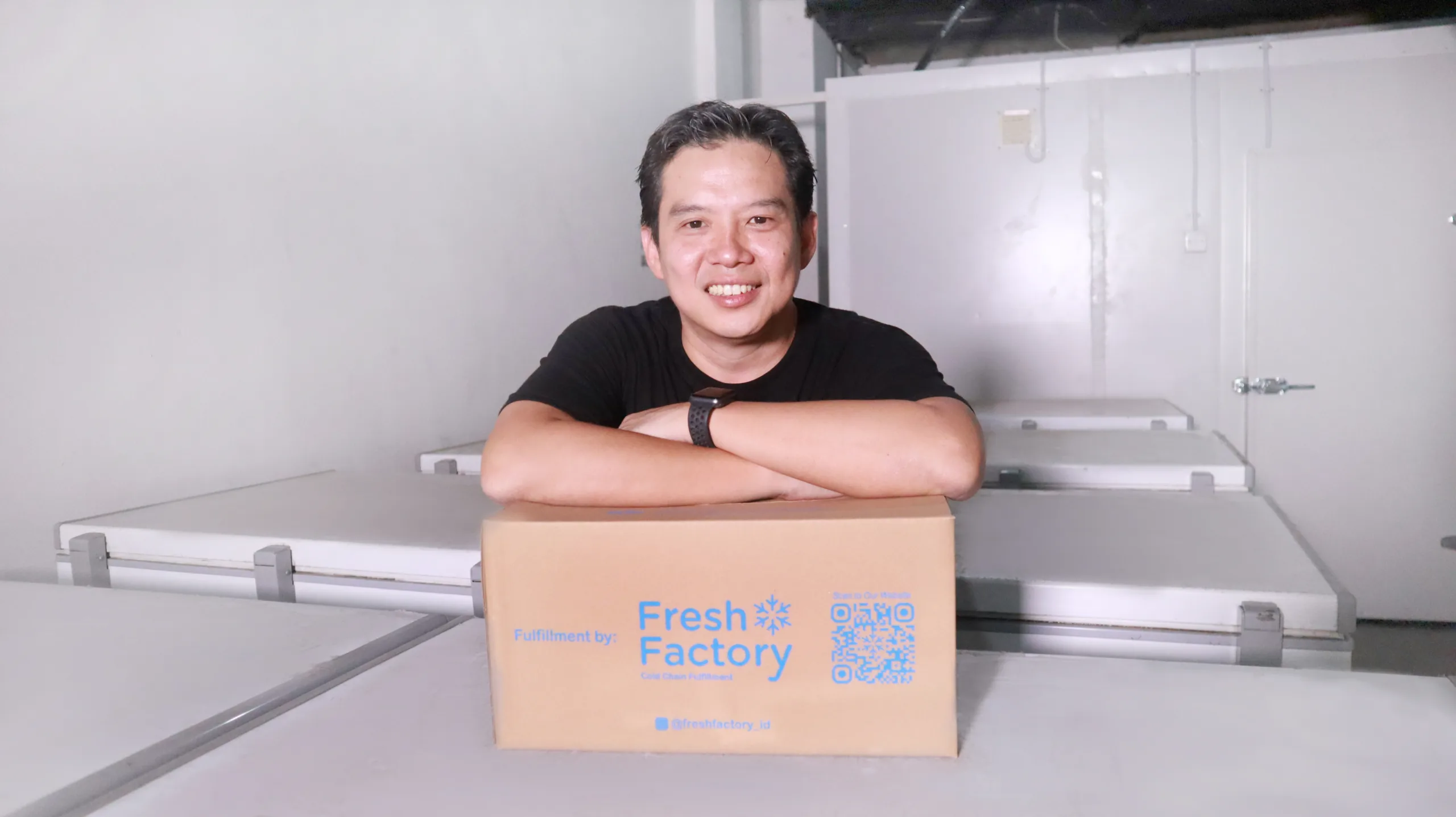
Larry brings a wealth of experience and leadership to the table, having previously served as the CEO at Net1 International and CFO at First Media. With a decade-long tenure at Citibank followed by key roles in telecommunications, Larry’s corporate journey laid the foundation for his entrepreneurial venture. Under his leadership, Fresh Factory has not only emerged as a promising startup but is poised to revolutionize the cold chain industry in Indonesia.
Join us in exploring Larry’s insights and experiences in our Q&A series, shedding light on his entrepreneurial journey and the future trajectory of Fresh Factory.
Q1: How did the idea for cold chain fulfillment come about, and what motivated you to pursue this specific venture?
Larry: The idea for cold chain fulfillment originated from my background and experiences. Having spent 10 years in the corporate world, including roles at Citibank and as CFO at First Media, I eventually transitioned to the telecommunications sector, as the CEO of Sampoerna Telekomunikasi Indonesia or Net1. Before the onset of Covid-19, I had been contemplating starting my own venture, and the pandemic provided the impetus I needed to take the leap.
Born in Ambon, Indonesia and known for its fishery resources, I drew inspiration from my family’s cold storage for fish. Attempting to sell fish online during the pandemic, I realized the challenges of delivering cold chain items directly to consumers due to the limitations of traditional delivery services. This realization led to the concept of hyperlocal fulfillment centers, strategically placed to facilitate faster, more cost-effective, and higher-quality deliveries for businesses dealing with cold chain products.
Q2: What challenges did you encounter when initially selling fish online, and how did this inform the development of your hyperlocal fulfillment centers?
Larry: Selling fish online directly to consumers revealed the difficulties of delivering cold chain items using regular delivery services, which primarily rely on motorcycles. These vehicles lack the necessary cold storage facilities, making it impractical and expensive for instant deliveries. The inherent risks and high costs associated with this delivery model prompted the idea of creating micro fulfillment centers.
The vision was to establish decentralized hyperlocal centers, located approximately every 8 kilometers, where businesses could store their inventory. This decentralized approach aimed to streamline order fulfillment, making it faster, more cost-efficient, and of higher quality. By strategically placing these fulfillment centers, we sought to address the unique challenges posed by the tropical climate, diverse aquaculture resources, and logistical complexities in Indonesia.
Q3: Can you elaborate on the vision behind your hyperlocal fulfillment centers and how they aim to revolutionize cold chain logistics in Indonesia?
Larry: The vision behind our hyperlocal fulfillment centers is to revolutionize cold chain logistics in Indonesia by addressing the unique challenges posed by the country’s geography, tropical climate, and evolving consumer needs. By establishing micro fulfillment centers every 8 kilometers, we aim to create a decentralized network that optimizes the delivery process for businesses dealing with cold chain products. Businesses can store their inventory in these strategically located centers, enabling faster, cheaper, and higher-quality deliveries.
This model not only caters to the increasing demand for protein-rich products in urban areas but also aligns with the changing dynamics of smaller living spaces and a growing preference for ready-to-cook frozen items. The hyperlocal approach ensures that businesses can efficiently fulfill orders, overcoming the limitations of traditional delivery services and contributing to the growth of the cold chain logistics sector in Indonesia.
Q4: What is the growth story of Fresh Factory (FF), particularly in terms of revenue and expansion?
Larry: Fresh Factory’s growth story is a testament to our journey from inception, with notable progress since we started addressing the challenges posed by the Covid-19 pandemic. In 2020, we began the journey by bootstrapping, and it wasn’t until 2021 that we became fully operational. From there, our monthly growth trajectory, measured by the Compound Annual Growth Rate (CAGR), consistently ranged between 20-30% over 12 months. Transitioning into 2022, we maintained a solid growth rate of 20%. In terms of revenue, we have witnessed remarkable expansion, going from zero to achieving a monthly revenue of $600,000.
Our network of fulfillment centers also experienced significant growth, starting from zero and expanding to 48 fulfillment centers across 27 cities in Indonesia and access to over 2000 warehouses through its partnerships. Additionally, our customer base evolved from zero to encompassing around 300 tenants or B2B customers. This substantial growth underscores the success of our model in meeting the unique demands of the cold chain logistics sector in Indonesia.
Our partnership with Trihill Capital has been instrumental in propelling Fresh Factory’s growth. Trihill Capital has played a pivotal role in providing not just financial support but also valuable insights and guidance. The monthly interactions with Alwyn, who serves as a Board of Observer, have been characterized by open dialogue, extensive questioning, and collaborative brainstorming sessions. This openness has enriched our decision-making process and contributed significantly to our strategic direction.
Trihill Capital’s support extends beyond mere financial contributions. They have actively engaged with us on industry trends, startup dynamics, and fundraising strategies. Their inputs have been crucial in offering perspectives on what works well for our business and what areas may need attention. Trihill Capital’s involvement began with their interest in our pre-seed round, and their continued support through the pre-A round, following the lead by SBI, reflects a strong partnership and shared commitment to our success.
Overall, Trihill Capital stands out as one of the prominent shareholders in Fresh Factory, contributing not only to the financial aspect but also providing valuable inputs and collaborative efforts towards our shared goals.
Q5: How has being a part of Y-Combinator impacted Fresh Factory’s approach to business, and what valuable insights have you gained from the program?
Larry: Being a part of Y-Combinator has significantly influenced our approach to business. The validation and recognition from an institution that has worked closely with numerous successful startups have bolstered our confidence. YC’s extensive experience has provided us with valuable insights into the nuances of building and scaling a startup.
One of the notable impacts is the ease with which we can now engage with early-stage VCs. The YC stamp of approval acts as a powerful endorsement, making it simpler to convey our story and vision. Additionally, the education received during the program, even conducted remotely at unconventional hours, has been invaluable. Learning from the successes and challenges of other startups has equipped us with a comprehensive understanding of the do’s and don’ts in the startup landscape.
Q6: How has the competitive landscape in the professional fulfillment cold chain market evolved, and how has Fresh Factory strategically positioned itself for success in this dynamic environment?
Larry: The landscape in the professional fulfillment cold chain has been relatively limited, with only a few companies playing a significant role. Most of these companies follow what I term as an “asset play,” operating large warehouses with thousands of pallets situated outside of Jakarta. These setups are what I refer to as mid-mile plays.
In contrast, Fresh Factory has adopted a distinct positioning. We operate in a decentralized manner, relying extensively on technologies such as Warehouse Management Systems (WMS) rather than pursuing an asset-centric approach. This unique positioning sets us apart from traditional players, offering a last-mile solution. Interestingly, while we differ in approach, we complement these established players by seamlessly integrating into the last-mile component of the logistics process.
The collaboration with existing players in the market reflects a shift where they, traditionally centralized, now partner with us to tap into the advantages of a decentralized and technology-driven model. The key distinctions lie in our reliance on technology, decentralized operations, and a focus on the non-asset aspect of the logistics game. This strategic positioning positions Fresh Factory for success in navigating the evolving dynamics of the cold chain logistics sector.
Q7: Looking ahead, how do you envision Fresh Factory evolving in the future?
Larry: Our vision for the future of Fresh Factory is ambitious and rooted in our commitment to not just being a good company but a great one. We aspire to revolutionize the entire cold chain industry in Indonesia. Our strategic approach involves reducing the minimum logistical restrictions that businesses face when scaling, essentially introducing a shared economy model in warehousing, fulfillment, and transportation within the cold chain sector.
In essence, Fresh Factory aims to become an end-to-end cold chain fulfillment company, marking a paradigm shift in the industry. Our goal is to disrupt the current landscape where only large cold chain companies have the capability to distribute nationally. We recognize the challenges faced by small and growing SMEs, and we intend to bridge this gap.
Furthermore, we are committed to addressing the issue of high logistic costs in the cold chain sector, which poses a significant challenge for businesses in Asia. By optimizing costs relative to revenue, Fresh Factory seeks to make cold chain logistics more accessible and cost-effective for businesses, thereby contributing to the growth and sustainability of the industry in the region.
Edited by: Daryl Lim





